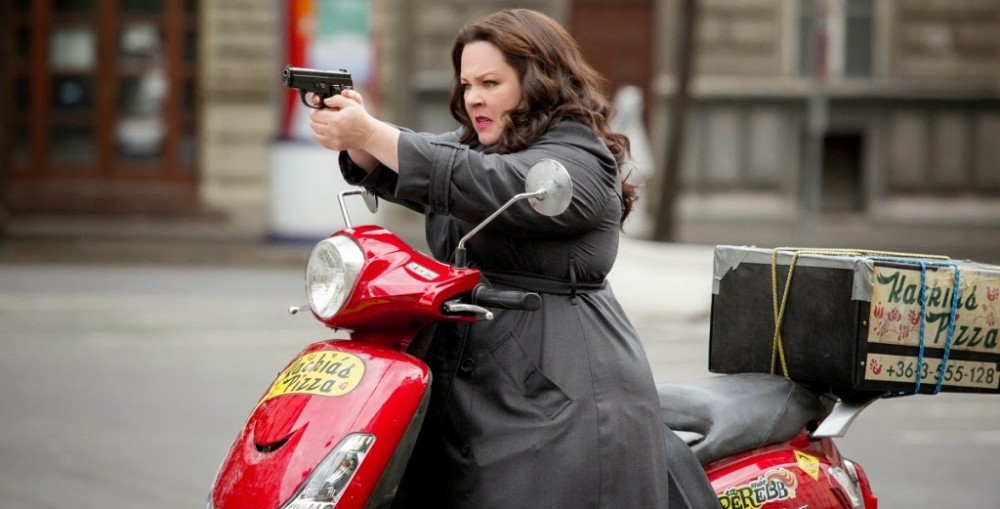
With all the rage about Spy going on, I expected to find myself in an exciting position: that of actually loving a movie that starred Melissa McCarthy in a leading role. Add to that the fact that the cast was littered with folks I dig just as much (if not far more, as is the case with Rose Byrne & Miranda Hart), and I was pumped. Little did I realize I’d be hit with something I can only refer to as “just fine” in this female-led spy spoof.
The whole film revolves around desk-bound CIA analyst Susan Cooper, who volunteers herself to become an agent when the identities of other agents are compromised. Now, as you can expect, there are a whole lot of jokes about McCarthy’s appearance; not as mean-spirited as in other films thankfully, but they remain there. Her secret identities are all the kind of insults you’d only lob at an overweight middle-aged woman and it gets tiresome, especially considering she spends half the time kicking ass and solving problems.
The other half, which is what should have been expanded on some more, is spent on developing Cooper as an actual, intelligent human being with emotions rather than just a desk clerk turned active agent. There’s a lot of attention put into making her a very tactical agent, improvising left and right for the sake of survival and getting the job done. But there isn’t much emotional heft to scenes where she’s placed in danger or when she witnesses someone she cares about in danger though, because the film is more preoccupied with getting laughs out of the audience (some of which work and a lot of which don’t).
In its first hour, Spy is kind of a slog to get through. There’s a lot of exposition and strange story-building that doesn’t really need to be there before reaching the best part of the film: practically every single interaction between Miranda Hart, Rose Byrne, and Melissa McCarthy’s characters in person (be it in pairs or all three together). The dialogue they bounce off each other, even when McCarthy is dropping fifty f-bombs per sentence, is some of the films strongest.
Each woman plays her role perfectly, and it almost leaves one to wonder how much better a film this would have been if the three of them had been the entire focus of the feature, rather than pieces of an ensemble that Feig didn’t quite have control of while writing. That being said, it is refreshing to find a narrative that allows men to be as expendable as possible while keeping the women on screen for plenty of time, even if it falters with that in its climax.
But outside of narrative flaws and successes, there’s just something about Paul Feig’s ability as a director that doesn’t quite jive with me. While many might argue that comedy doesn’t quite need a particular style, nothing about his direction pops. It all feels by the beat and entirely reliant on his scripts (and occasionally his actors), which is fine and perfectly in tune with the fact that he primarily worked in television. And yet, one longs for more visual gags that don’t attempt to gross out – the Beaches watch makes for a perfect example – as well as a little more coherence in scenes of action. They’re good, and certainly enjoyable enough, but with the visuals that certain entries in both genres come with nowadays, one expects more.
While it’s all a big step up from The Heat in terms of both writing and direction, I can’t help but wonder (and not optimistically) if anything Feig makes from this point on will ever hit the highs that he once reached with Bridesmaids. Hopefully Ghostbusters will prove me wrong. Now, somebody get me that buddy comedy between Hart and McCarthy I never knew I desperately needed until now.
—
Spy is now playing in theaters everywhere.
Directed by Paul Feig; written by Paul Feig; starring Melissa McCarthy, Miranda Hart, Rose Byrne, Jude Law, Jason Statham and Bobby Cannavale; 122 minutes.



 Derek
Derek
 Isabelle
Isabelle